Natural killer cells exhibit increased antitumor activity through CDK8 deletion

Symbolic photo: With specially designed mice it was shown that Natural Killer cells are activated against Tumors without the Protein CDK8. Vetmeduni Vienna
Decades have been spent investigating how cancer cells manage to reproduce while evading the control of the immune system. So-called immunotherapies are currently being researched as a way to strengthen the body’s immune system response against tumors. Researchers from the Institute of Pharmacology and Toxicology at Vetmeduni Vienna, with first author Agnieszka Witalisz-Siepracka, have made important progress in this direction.
They show how the activity of NK cells against tumors can be enhanced through the deletion of the CDK8 gene. CDK8 is a cyclin-dependent kinase that controls several vital functions within human cells. When CDK8 is hyperactive, it can result in cell transformation.
In their study in Cancer Immunology Research, the researchers focused on the tumor surveillance system. They were able to show that CDK8 plays a special part in NK cells, where it suppresses their activity. By deleting CDK8, the research team succeeded in significantly restricting tumor growth in mice. Witalisz-Siepracka draws the following conclusions: “Deletion of CDK8 led to increased activation of the NK cells. You could say they became ‘armed’. Their ability to kill grew and the tumor shrank.”
This study builds on a previously published study by the same research group in which the researchers had postulated that CDK8 has a pivotal role in the killing activity of NK cells in cell culture models. Now they have gone an important step further by transferring their knowledge to tumor growth in vivo. “This had not been confirmed in a living organism before,” says Witalisz-Siepracka. “Because there are currently a number of preclinical studies on the development of CDK8 inhibitors, we wanted to determine the effects CDK8 deletion would have on the NK cells.”
“Arming” an immunological weapon through the deletion of CDK8
The researchers obtained their research results by using specially designed mice with selective deletion of CDK8 in NK cells. “We need a new class of CDK8 inhibitors for immunotherapy. Such an inhibitor would have to trigger the breakdown of the entire CDK8 protein. In addition to the tumor cell-intrinsic effect, the immune system would also be activated to fight the tumor cells. The result would be a double blow against the cancer cells.” Senior author Veronika Sexl summarizes the findings: “Degradation of CDK8 could be a promising way to fight tumors using the body’s own arsenal.”
Service:
The article “NK Cell-Specific CDK8 Deletion Enhances Antitumor Responses” by Agnieszka Witalisz-Siepracka, Dagmar Gotthardt, Michaela Prchal-Murphy, Zrinka Didara, Ingeborg Menzl, Daniela Prinz, Leo Edlinger, Eva Maria Putz and Veronika Sexl was published in Cancer Immunology Research.
http://cancerimmunolres.aacrjournals.org/content/early/2018/03/20/2326-6066.CIR-…
About the University of Veterinary Medicine, Vienna
The University of Veterinary Medicine, Vienna in Austria is one of the leading academic and research institutions in the field of Veterinary Sciences in Europe. About 1,300 employees and 2,300 students work on the campus in the north of Vienna which also houses five university clinics and various research sites. Outside of Vienna the university operates Teaching and Research Farms. The Vetmeduni Vienna plays in the global top league: in 2017, it occupies the excellent place 8 in the world-wide Shanghai University veterinary in the subject “Veterinary Science”. http://www.vetmeduni.ac.at
Scientific Contact:
Agnieszka Witalisz-Siepracka
Institute of Pharmacology and Toxikology
University of Veterinary Medicine Vienna (Vetmeduni Vienna)
T +43 1 25077-2900
agnieszka.witalisz-siepracka@vetmeduni.ac.at
Released by:
Georg Mair
Science Communication / Corporate Communications
University of Veterinary Medicine Vienna (Vetmeduni Vienna)
T +43 1 25077-1165
georg.mair@vetmeduni.ac.at
http://www.vetmeduni.ac.at/en/infoservice/presseinformation/presse-releases-2018…
Media Contact
All latest news from the category: Life Sciences and Chemistry
Articles and reports from the Life Sciences and chemistry area deal with applied and basic research into modern biology, chemistry and human medicine.
Valuable information can be found on a range of life sciences fields including bacteriology, biochemistry, bionics, bioinformatics, biophysics, biotechnology, genetics, geobotany, human biology, marine biology, microbiology, molecular biology, cellular biology, zoology, bioinorganic chemistry, microchemistry and environmental chemistry.
Newest articles

A cause of immunodeficiency identified
After stroke and heart attack: Every year, between 250,000 and 300,000 people in Germany suffer from a stroke or heart attack. These patients suffer immune disturbances and are very frequently…

Wildfire danger to increase due to climate change
WSL Institute for Snow and Avalanche Research (SLF) researchers expect an elevated wildfire danger in the Alpine Foreland from 2040 onwards due to changing meteorological conditions. The danger currently remains…

Advanced Brain Science Without Coding Expertise
Researchers at Helmholtz Munich and the LMU University Hospital Munich introduce DELiVR, offering a new AI-based approach to the complex task of brain cell mapping. The deep learning tool democratizes…





















